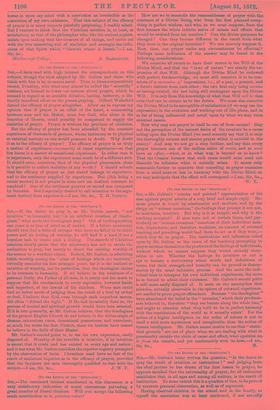[TO THE EDITOR OF THIS "SPECTATOR-']
Sin,—The continued interest manifested in this discussion is a very satisfactory indication of moral earnestness pervading a great number of liberal thinkers. Will you accept the following crude contribution to it, quantum valeat ? How are we to reconcile the reasonableness of prayer with the existence of a Divine Being, who from the first planned every- thing in perfect wisdom, and who, as we must suppose, from the first foresaw the whole infinite series of causes and effects that. would be evolved from his creation ? Can the divine purposes be changed ? Can they become different in the result from what they were in the original intention ? We can scarcely suppose it. How, then, can prayer under any circumstances be effectual?' Perhaps some indication of the answer may be found in the, following considerations.
We conceive all events to have their source in the Will of the- Divine Mind, and that the "laws of nature" are merely the ex- pression of that Will. Although the Divine Mind be endowed with perfect foreknowledge, we must still conceive it to be con- scious of a succession of impressions, i.e., of a past, a present, and a future distinct from each other ; the two first only being certain! as having existed, the last being still contingent upon the Divine- Will. It is only from Ilia knowledge of what that Will will be that- even God can be certain as to the future. We must also conceive- the Divine Mind to be susceptible of satisfaction (if we may use the expression) in the evolution and working-out of His plans, and in. so far of being influenced and acted upon. by what we may term, external causes.
Now why may not prayer in itself be one of these causes? May not the perception of the earnest desire of the creature be a cause- acting upon the Divine Mind (we need scarcely say that it is only the thoroughly earnest and sincere prayer which is entitled to the- name)? And may we not go a step further, and say that every prayer becomes one of the endless series of events, and so must' have an effect, —what, or in what way, is beyond us to know ?' That the Creator foresaw that such cause would arise need not. diminish its influence when it actually arisen. It seems only reasonable farther to conceive that according as prayer emanates. from a mind more or less in harmony With the Divine Mind, Bo- we may anticipate that the effect will correspond.—I am, Sir, &c.,.
W. Y.


































 Previous page
Previous page